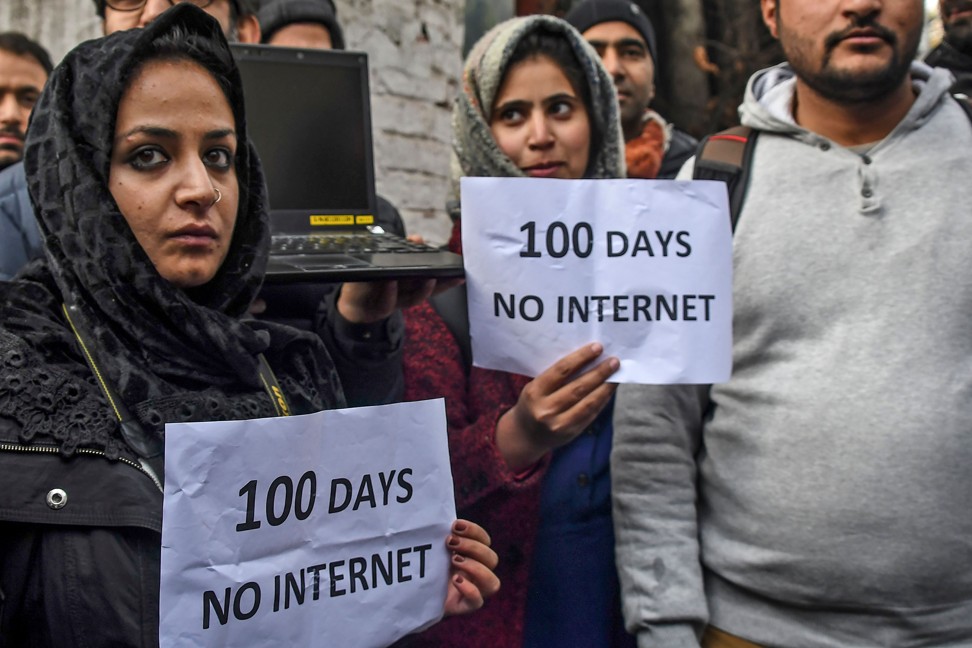India and China may have border disputes, but they find common ground on dealing with protests
- The Indian government’s authoritarian approach to dealing with protests against a recently introduced citizenship bill, including shutting down the internet in parts of the country, has found support in China

India and China held the 22nd round of boundary talks on December 21 in New Delhi and, predictably, the meeting between Indian National Security Adviser Ajit Doval and Chinese Foreign Minister Wang Yi concluded cordially with little tangible progress.
Familiar platitudes were reiterated to maintain peace and tranquillity along one of the world’s longest undemarcated borders – almost 3,500km – and this masked the various areas of discord and dissonance between the Asian giants, including China’s support of Pakistan’s opposition to India’s decision to strip the state of Jammu and Kashmir, a territory Pakistan claims, of its special status and to bifurcate it into two union territories. China also claims parts of the territory.
The official statement from the Indian foreign office noted that both sides “should respect each other’s sensitivities and concerns”. The unstated subtext here is non-interference in each other’s internal affairs.
India is currently dealing with a large student-led nationwide protest against the controversial Citizenship Amendment Act (CAA) that was enacted by parliament on December 11. The act is being seen as a transgression of the spirit of the Indian constitution because it links the award of citizenship to refugees to religion – and excludes those of the Muslim faith.
Student protesters in India have been inspired by their peers in Hong Kong, with the Hong Kong protests strengthening Indian protesters’ resolve to stand up for their democratic rights. The stark contrast between the demography of India and Hong Kong had many students in Delhi thinking that if the much smaller student community in Hong Kong can remain resolute, they should too.
Indian law enforcement agencies have dispersed the protests, which have at times involved violence and arson. There have been 25 deaths in different parts of the country and many more have been injured.
Some states have deployed the police in a visibly muscular manner and local governments have invoked various security provisions, including a shutdown of the internet. This was initially enforced in the north-eastern states and later imposed in other parts of India for limited periods, including in parts of the national capital Delhi.
Among those around the world expressing concern over how the Indian government has been dealing with the protests was the United Nations secretary general. Indian Prime Minister Narendra Modi’s government has been accused of being increasingly authoritarian towards the protesters and discriminatory towards the country’s Muslim minority community, which comprises almost 200 million of India’s total population of 1.3 billion.
India has often taken recourse to shutting down the internet as a precautionary measure against social disorder. The most extreme was the total communication shutdown in Kashmir on August 5 which continued for two months. Internet services have not yet been restored.
India, the world’s largest democracy, tops the global rankings of nations that have shut down the internet. According to a global review, in 2018 there were a total of 196 documented internet shutdowns across 25 nations in Asia and Africa. India accounted for 134, or 68 per cent, of these shutdown.
This measure has been justified by the law enforcement agencies because there have been tragic instances of mob violence, leading to the lynching of innocent people, triggered by fake news and false alarms, especially related to child abductions, that spread like wildfire on social media platforms.
Indians have resisted restrictions on their access to the internet. A college student in the southern state of Kerala moved the courts in early 2019 to protest against restrictions on the use of mobile phones during certain hours in her hostel. In a significant judgment, the Kerala High Court in September held that access to the internet is a fundamental right tied to the right to education and the right to privacy guaranteed by the Constitution of India.

While India’s frequent shutdown has earned the disapproval of liberals globally, the Modi government has received endorsement from an unexpected quarter – Beijing.
Peoples Daily carried an opinion column “India’s internet shutdown shows normal practice for sovereign countries” by Qing Qiu, in which the author argued that India’s shutdown of the internet to control the protests “means that shutting down the internet in a state of emergency should be standard practice for sovereign countries”.
The article pointed to the Western double standard on the issue with regard to India and China, noting “since the 1950s, America has seen India as an example of democracy in Asia” but that when China carried out a similar clampdown in the Xinjiang region a few years ago to deal with a national security threat “it attracted sharp criticism from mainstream media in Europe and the US”.
Regulating people’s access to the internet in such a manner that the balance between the security concerns of the state, the basic rights of the citizen and the imperatives of the market is appropriately and equitably maintained is a complex governance challenge.
There is no single template that can be held up as ideal but the paradox of an authoritarian state like China endorsing the experience of a democratic India in curtailing citizen access to the internet is symptomatic of the unlikely contradictions that have punctuated the political landscape of 2019.
Commodore C. Uday Bhaskar is director of the Society for Policy Studies (SPS), an independent think tank based in New Delhi